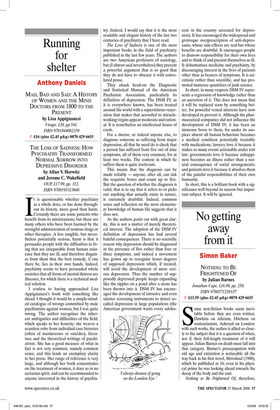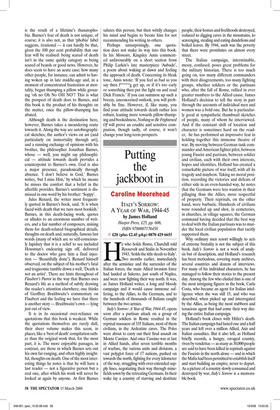No getting away from it
Simon Baker
NOTHING TO BE FRIGHTENED OF by Julian Barnes Jonathan Cape, £16.99, pp. 250, ISBN 9780571239337 ✆ £13.59 (plus £2.45 p&p) 0870 429 6655 Some non-fiction books seem inevitable before they are even written. Dawkins on atheism, Hitchens on contrarianism, Ackroyd on London: with such works, the author is allied so closely to the subject that it is a question of when, not if, their full-length treatment of it will appear. Julian Barnes on death must fall into that category. Barnes’s preoccupation with old age and extinction is noticeable all the way back in his first novel, Metroland (1980), which he published at 34; even in his physical prime he was looking ahead towards the decay of the body and the end.
Nothing to Be Frightened Of, therefore, is the result of a lifetime’s thanatophobia. Barnes’s fear of death is not unique, of course; it is also not, as that ‘phobia’ label suggests, irrational — it can hardly be that, given the 100 per cent probability that our fear will be realised: being scared of death isn’t in the same quirky category as being scared of beards or good news. However, he does seem to have an acute case; how many other people, for instance, can admit to having woken up in late middle-age and, in a moment of concentrated frustration at mortality, begun thumping a pillow while groaning ‘oh no Oh No OH NO’? This is what the prospect of death does to Barnes, and this book is the product of his thoughts on the matter, once the pillow-thumping has abated.
Although death is the destination here, however, Barnes takes a meandering route towards it. Along the way are autobiographical sketches, the author’s views on art (and particularly on immortality through art), and a running exchange of opinions with his brother, the philosopher Jonathan Barnes, whose — well, you might say philosophical — attitude towards death provides a counterpoint to Barnes’s own. God is also a major presence, paradoxically through absence. ‘I don’t believe in God,’ Barnes writes, ‘but I miss Him,’ by which he means he misses the comfort that a belief in the afterlife provides. Barnes’s sentiment is dismissed in one word by his brother: ‘Soppy’.
Jules Renard, the writer most frequently quoted in Barnes’s book, said, ‘It is when faced with death that we turn most bookish.’ Barnes, in this death-facing work, quotes or alludes to an enormous number of writers, and a fair number of composers, mining them for death-related biographical details, thoughts on death and, naturally, famous last words (many of which are so self-consciously lapidary that it is a relief to see included Housman’s endearing sign off, delivered to the doctor who gave him a final injection — ‘Beautifully done’). Renard himself observed, on the subject of his mother’s fatal and tragicomic tumble down a well, ‘Death is not an artist’. There are hints throughout of Flaubert’s Parrot in the way that Barnes uses Renard’s life as a method of subtly drawing the reader’s attention elsewhere; one thinks of Geoffrey Braithwaite’s commentary on Flaubert and the feeling we have that there is another story — Braithwaite’s own — lying just out of view.
It is in its occasional over-reliance on quotations that this book is weakest. While the quotations themselves are rarely dull, their sheer volume makes this seem, in places, like a ‘best of death’ compilation rather than the original work that, for the most part, it is. The more enjoyable passages, in contrast, are those in which Barnes sets out his own far-ranging, and often highly insightful, thoughts on death. One of the most interesting things he notes is that he will have a last reader — not a figurative person but a real one, after which his work will never be looked at again by anyone. At first Barnes salutes this person, but then wittily changes his mind and begins to berate him for not recommending his writing to others.
Perhaps unsurprisingly, one quotation does not make its way into this book. In his Memoirs, Kingsley Amis commented unfavourably on a short section from Philip Larkin’s late masterpiece ‘Aubade’, a poem about waking at dawn and feeling the approach of death. Concerning its bleak tone, Amis wrote: ‘If you feel as bad as you say then f*****g get up, or if it’s too early or something then put the light on and read Dick Francis.’ If you can summon up such a breezy, unconcerned outlook, you will probably be fine. However, if, like many, you find your attitude towards death rather less robust, leaning more towards pillow-thumping and bookishness, Nothing to Be Frightened Of will prove an erudite and sensitive companion, though sadly, of course, it won’t change your long-term prospects.



























































































 Previous page
Previous page